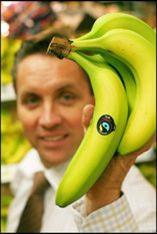
Sainsbury’s chief executive Justin King has accused rival retailers of trying to “test our resolve” on Fairtrade pricing.
At the grocer’s first Fairtrade conference in London on Tuesday, he threw down the gauntlet for other supermarkets to challenge
J Sainsbury’s position as the world’s largest retailer of Fairtrade products - a statistic that was confirmed this week.
Sainsbury’s stocks more than 800 Fairtrade lines, generating an annual premium of £10.2 million. The supermarket’s annual Fairtrade sales have increased by around 10 per cent on this time last year, up to £218m.
But King told delegates on Tuesday that “one of our main rivals has been slashing prices on bananas in the last five years and they have been trying to test our resolve with Fairtrade”.
Last October, Asda chopped its banana prices down to 38p a kilo, causing widespread indignation among pressure groups that believed the price cut could not be possible without being passed on to the primary producer.
King said: “We knew we wanted to make a big difference with Fairtrade and that it had to be on a big line like bananas. We were aware we would have to put a premium on it.
“I am a capitalist and there has always been this perceived competition between capitalism and beliefs. With Fairtrade, I firmly believe that it is in everyone’s best interest, as it’s great for producers, it’s great for consumers and it’s great for consumer capital.”
Sainsbury’s invited other retailers from around Europe to the conference at its Holborn headquarters, with King urging them to “take up Fairtrade - you’ll have a job knocking us off the number-one spot but we want you to adopt it and try”.
However, there was a palpable sense of realism at the event. Julius Polius, president of the Windward Islands Farmers’ Association, described both the triumphs and travails of the Fairtrade system.
He said: “Without Fairtrade, there would not be a banana industry in the Windwards, as we were struggling to compete with larger international companies.”
Polius said that improved healthcare systems, community projects, education and ventures in eco-tourism represented the positives of the movement, but added that the steep increase in production costs, the challenge of keeping farmers in rural industry, maintaining GlobalGAP standards on farm, dealing with hurricanes and decreasing soil quality all made producing Fairtrade-quality bananas difficult.
Last week, Sainsbury’s hosted two Fairtrade conferences - in Cape Town, South Africa and Nairobi, Kenya - as it linked up its own staff, suppliers, representatives of the department for international development and various NGOs.
Fairtrade Foundation executive director Harriet Lamb, speaking ahead of Fairtrade Fortnight, which kicks off next week, said the movement would next be targeting Asia as “most of the world’s poor live there and we need to introduce Fairtrade in a bigger way”.
She also said the movement would be working more in areas of conflict, such as Nicaragua and Palestine.
During Fairtrade Fortnight, more than 1.4m bags of Fairtrade bananas on sale across Tesco, Sainsbury’s, Waitrose, Asda and The Co-operative will carry special Big Swap stickers, as the foundation looks to get people to swap to Fairtrade.
The Fairtrade licensees supporting the stickering are Pratts, Winfresh, Dole, Fyffes and Mack Multiples.



